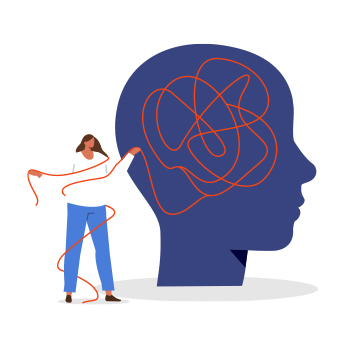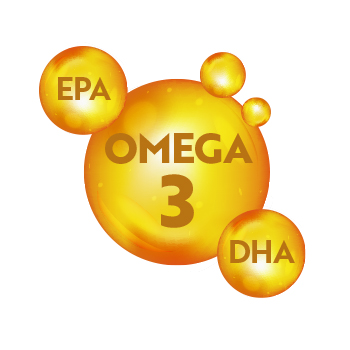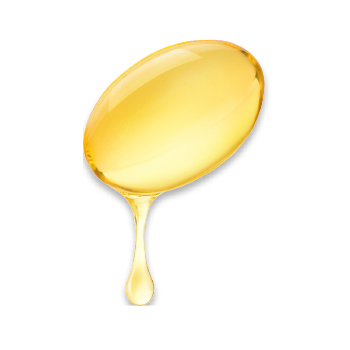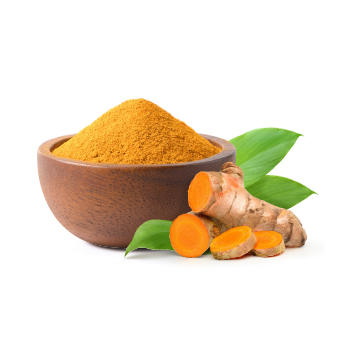Inflammation as a Preface to Mood Disorders
A significant number of people with mood disorders like anxiety and depression have been shown to have elevated levels of inflammatory markers throughout their bodies and in their cerebrospinal fluid.4 In depressive patients, inflammatory cytokines in the cerebrospinal fluid are correlated with the severity of their depression.5 Researchers are still figuring out exactly what triggers the inflammation in mental health disorders, but one theory is that chronic stress and early life stress and trauma—which many people report experiencing before they develop a mood disorder—prompts an immune response that increases both systemic and neuroinflammation via inflammatory immune cells and cytokines.6 7 Other sources of inflammation can include poor sleep quality, a high body mass index (BMI), and a poor diet.8
Inflammation has a detrimental effect on the brain and can change both its structure and how it functions, with some research reporting that anxiety symptoms “represent brain alterations caused by neuro-inflammation.” Studies using neuroimaging have found that inflammation negatively impacts regions of the brain, like the basal ganglia, that play a crucial role in emotional regulation and reward processing, as well as “anxiety-related” regions like the amygdala, which has the important job of processing and regulating emotions, particularly fear, anxiety, and aggression.9 10 Neurotransmitter systems are also negatively affected by inflammation. For example, studies have found that inflammation affects our pleasure and reward centers and the neurotransmitter dopamine, leading to reduced motivation and fatigue.11 12 13 All of these inflammation-driven changes in the brain can lead to behavioral changes.
Cool, Calm, and Collected: Taming the Flames of Inflammation
The evidence that inflammation plays a major role in mental health disorders is clear, so the question remains, how do you put out the fire? Fortunately, there is an arsenal of lifestyle and dietary strategies that can fairly easily be implemented to reign in inflammation, including regular physical activity;14 15 stress-reducing practices like yoga, tai chi, sauna, and meditation;16 17 good sleep hygiene that promotes quality sleep;18 19 changes to your diet, specifically replacing ultra-processed foods with anti-inflammatory foods;20 21 and dietary supplements, such as the omega-3 fats.22 23
Ditch the ultra-processed food and embrace an anti-inflammatory diet
What we eat matters for every aspect of our health, especially mental health. An analysis of 21 studies published in Psychiatry Research concluded that a diet rich in fruit, vegetables, whole grains, fish, olive oil, dairy, and antioxidants was associated with a decreased risk of depression, while a diet high in processed meat, refined grains, sweets, and low intakes of fruit and vegetables was associated with an increased risk of depression.24 In fact, one study found that people who ate a lot of ultra-processed food were 51 percent more likely to develop depression compared to those who rarely ate it; the study specifically mentioned fast food like hamburgers and pizza and processed pastries like muffins, doughnuts, and croissants.25 Studies that have compared traditional diets, such as the Mediterranean diet or traditional Japanese diet, to the standard American diet (high in ultra-processed ingredients like sugar, seed oils, and refined flours) have found that the risk of depression is 25 to 35 percent lower in people who eat a more traditional diet.26 Research investigating fruit and vegetable intake and depression risk has consistently found that lower intakes are related to a higher risk of depression.26 27 28 29 Though it hasn’t been studied as extensively, research has shown similar results when looking at diet and anxiety.30 31 When you look at the types of diets that support good mental health, they are full of anti-inflammatory foods like vegetables and fruit and healthy fats. These foods are rich in micronutrients, antioxidants, and other phytonutrients that effectively reduce inflammation—make them a priority. And because pesticides have shown to increase neuroinflammation, be sure to choose organically grown produce!32
Increase protection with inflammation-modulating supplements
Omega-3 fatty acids
The omega-3 fats, EPA and DHA, are some of the most extensively studied dietary supplements for reducing inflammation; they have also been widely studied in relation to mental health. When it comes to anxiety and depression specifically, it appears that a higher ratio of EPA to DHA is the most effective. A recent meta-analysis of 10 random-controlled trials including 1,426 patients indicates that a higher EPA:DHA ratio (60 percent or greater EPA) has the most antidepressant effect, with doses between one and two grams/daily (of EPA) being the most effective.33 A study investigating the omega-3’s effect on inflammation and anxiety in medical students found that a dose of 2.5 grams omega-3 daily (2,085 EPA/348 DHA) for 12 weeks lead to a decrease in the production of inflammatory cytokines and a 20 percent reduction in anxiety symptoms.34 Because omega-3 fats are generally missing from the Western diet, to ensure optimal levels, supplementing is necessary.
Vitamin D
Add mental health to the long list of ways vitamin D supports health. When it comes to neuroinflammation, vitamin D packs a one-two punch, working on both the immune system and central nervous system. As already mentioned, an overactive immune response to stress, which leads to chronic inflammation, is implicated in the development of anxiety and depression; vitamin D is an immunomodulator, ensuring that the immune system neither over- nor under-responds when it is activated. Vitamin D also plays a critical role in the structure and function of the brain—there are vitamin D receptors in areas of the brain that control behavior and are involved in emotional processing, vitamin D regulates serotonin synthesis, and it has a neuroprotective effect by modulating inflammation in the brain.35 36 Low vitamin D levels are associated with increased symptoms of both anxiety and depression.37 38 If you suffer from anxiety and/or depression, consider having your vitamin D levels checked; deficiency is considered to be blood levels below 20 ng/mL while optimal levels are between 40 and 50 ng/mL.
Curcumin
Research shows that this polyphenol, found in turmeric, is one of the most effective natural anti-inflammatories available, and because it can cross the blood-brain barrier and reach brain tissue, it’s especially effective for neuroinflammation. Studies have found that oral administration of curcumin reduces the activity and number of a variety of pro-inflammatory molecules and preserves glutathione concentrations in the hippocampus, a part of the brain that plays a role in emotional regulation, including anxiety and “avoidance behaviors.” Glutathione is a powerful antioxidant produced by the body and has a protective effect on brain cells in the presence of inflammation.39 40 Finally, curcumin has been shown to regulate neurotransmitters, especially serotonin, dopamine, and norepinephrine, a neurotransmitter that plays a critical role in the body’s stress response.41
A 2024 meta-analysis that included eight random-controlled trials with 567 participants found that curcumin intake had a significant effect on relieving anxiety symptoms, particularly those with “greater intensity of anxiety.” It also found that taking curcumin for longer durations (12 weeks or more) in patients 45 years and under lead to more improvement in anxiety symptoms.42 Another study including patients with major depressive disorder found that 1,000 mg of curcumin daily, taken both with and without a common prescription anti-depressant, lead to a significant reduction in depression scores.43 Studies show that an effective dose for mental health ranges between 1,000 mg and 2,000 mg/daily.44
Anxiety and depression are complex mental health disorders that manifest for different reasons, but we know that underlying inflammation plays a significant role. There is no single magic fix, but by addressing the inflammation and using other tools in your mental health kit (talk therapy, mindfulness practices, exercise, etc.) you can be on your way to feeling your best again. You deserve it.
References
- National Alliance on Mental Illness. (2025, January 3). Anxiety Disorders | NAMI. NAMI. https://www.nami.org/about-mental-illness/mental-health-conditions/anxi…
- Major Depression. (n.d.). National Institute of Mental Health (NIMH). https://www.nimh.nih.gov/health/statistics/major-depression
- Xiang, A. H., Martinez, M. P., Chow, T., Carter, S. A., Negriff, S., Velasquez, B., Spitzer, J., Zuberbuhler, J. C., Zucker, A., & Kumar, S. (2024). Depression and anxiety among US children and young adults. JAMA Network Open, 7(10), e2436906. https://doi.org/10.1001/jamanetworkopen.2024.36906
- Michopoulos, V., Powers, A., Gillespie, C. F., Ressler, K. J., & Jovanovic, T. (2017). Inflammation in Fear- and Anxiety-Based Disorders: PTSD, GAD, and Beyond. Neuropsychopharmacology : official publication of the American College of Neuropsychopharmacology, 42(1), 254–270. https://doi.org/10.1038/npp.2016.146
- Felger J. C. (2018). Imaging the Role of Inflammation in Mood and Anxiety-related Disorders. Current neuropharmacology, 16(5), 533–558. https://doi.org/10.2174/1570159X15666171123201142
- Won, E., & Kim, Y. K. (2020). Neuroinflammation-Associated Alterations of the Brain as Potential Neural Biomarkers in Anxiety Disorders. International journal of molecular sciences, 21(18), 6546. https://doi.org/10.3390/ijms21186546
- Lee, C. H., & Giuliani, F. (2019). The Role of Inflammation in Depression and Fatigue. Frontiers in immunology, 10, 1696. https://doi.org/10.3389/fimmu.2019.01696
- Felger J. C. (2018). Imaging the Role of Inflammation in Mood and Anxiety-related Disorders. Current neuropharmacology, 16(5), 533–558. https://doi.org/10.2174/1570159X15666171123201142
- Felger J. C. (2018). Imaging the Role of Inflammation in Mood and Anxiety-related Disorders. Current neuropharmacology, 16(5), 533–558. https://doi.org/10.2174/1570159X15666171123201142
- Professional, C. C. M. (2025, March 19). Amygdala. Cleveland Clinic. https://my.clevelandclinic.org/health/body/24894-amygdala
- Felger J. C. (2018). Imaging the Role of Inflammation in Mood and Anxiety-related Disorders. Current neuropharmacology, 16(5), 533–558. https://doi.org/10.2174/1570159X15666171123201142
- Haroon, E., Miller, A. H., & Sanacora, G. (2017). Inflammation, Glutamate, and Glia: A Trio of Trouble in Mood Disorders. Neuropsychopharmacology : official publication of the American College of Neuropsychopharmacology, 42(1), 193–215. https://doi.org/10.1038/npp.2016.199
- Felger, J. C., & Treadway, M. T. (2017). Inflammation Effects on Motivation and Motor Activity: Role of Dopamine. Neuropsychopharmacology : official publication of the American College of Neuropsychopharmacology, 42(1), 216–241. https://doi.org/10.1038/npp.2016.143
- Gleeson, M., Bishop, N. C., Stensel, D. J., Lindley, M. R., Mastana, S. S., & Nimmo, M. A. (2011). The anti-inflammatory effects of exercise: mechanisms and implications for the prevention and treatment of disease. Nature Reviews. Immunology, 11(9), 607–615. https://doi.org/10.1038/nri3041
- Kip, E., & Parr-Brownlie, L. C. (2023). Healthy lifestyles and wellbeing reduce neuroinflammation and prevent neurodegenerative and psychiatric disorders. Frontiers in neuroscience, 17, 1092537. https://doi.org/10.3389/fnins.2023.1092537
- Bower, J. E., & Irwin, M. R. (2016). Mind-body therapies and control of inflammatory biology: A descriptive review. Brain, behavior, and immunity, 51, 1–11. https://doi.org/10.1016/j.bbi.2015.06.012
- Kunutsor, S. K., Laukkanen, T., & Laukkanen, J. A. (2018). Longitudinal associations of sauna bathing with inflammation and oxidative stress: the KIHD prospective cohort study. Annals of medicine, 50(5), 437–442. https://doi.org/10.1080/07853890.2018.1489143
- Mount Sinai Health System. (2022, September 21). A consistent lack of sleep negatively impacts immune stem cells, increasing risk of inflammatory disorders and heart disease. Mount Sinai Health System. https://www.mountsinai.org/about/newsroom/2022/a-consistent-lack-of-sle…
- Kip, E., & Parr-Brownlie, L. C. (2023). Healthy lifestyles and wellbeing reduce neuroinflammation and prevent neurodegenerative and psychiatric disorders. Frontiers in neuroscience, 17, 1092537. https://doi.org/10.3389/fnins.2023.1092537
- Tristan Asensi, M., Napoletano, A., Sofi, F., & Dinu, M. (2023). Low-Grade Inflammation and Ultra-Processed Foods Consumption: A Review. Nutrients, 15(6), 1546. https://doi.org/10.3390/nu15061546
- Anti inflammatory diet. (2024, February 20). Johns Hopkins Medicine. https://www.hopkinsmedicine.org/health/wellness-and-prevention/anti-inf…
- Kiecolt-Glaser, J. K., Belury, M. A., Andridge, R., Malarkey, W. B., & Glaser, R. (2011). Omega-3 supplementation lowers inflammation and anxiety in medical students: a randomized controlled trial. Brain, behavior, and immunity, 25(8), 1725–1734.
- Banaszak, M., Dobrzyńska, M., Kawka, A., Górna, I., Woźniak, D., Przysławski, J., & Drzymała-Czyż, S. (2024). Role of Omega-3 fatty acids eicosapentaenoic (EPA) and docosahexaenoic (DHA) as modulatory and anti-inflammatory agents in noncommunicable diet-related diseases – Reports from the last 10 years. Clinical Nutrition ESPEN, 63, 240–258. https://doi.org/10.1016/j.clnesp.2024.06.053
- Li Y, Lv M-R, Wei Y-J, et al. “Dietary patterns and depression risk: A meta-analysis.” Psychiatry Research, July 2017;253:373-382
- Almudena Sánchez-Villegas, Estefania Toledo, Jokin de Irala, Miguel Ruiz-Canela, Jorge Pla-Vidal, Miguel A Martínez-González. “Fast-food and commercial baked goods consumption and the risk of depression.” Public Health Nutrition, 2011; 15 (03): 424
- Selhub E, MD. “Nutritional psychiatry: Your brain on food.” Harvard Health Blog, Nov 2015; updated March 2020
- Payne M, PhD, Steck S PhD, George R, Steffens D, MD. “Fruit, Vegetable, and Antioxidant Intakes are Lower in Older Adults with Depression.” Journal of the Academy of Nutrition and Dietetics; Dec 2012:112(12)
- Huang Q, Liu H, et al. “Linking What We Eat to Our Mood: A Review of Diet, Dietary Antioxidants, and Depression.” Antioxidants, Sep 2019;8(9): 376
- Angelino D, Godos J, Ghelfi F, et al. “Fruit and Vegetable Consumption and Health Outcomes: An Umbrella Reivew of Observational Studies.” Int J Food Sci Nutr. Sept 2019;70(6): 652-667.
- Aucoin, M., LaChance, L., Naidoo, U., Remy, D., Shekdar, T., Sayar, N., Cardozo, V., Rawana, T., Chan, I., & Cooley, K. (2021). Diet and Anxiety: A Scoping Review. Nutrients, 13(12), 4418. https://doi.org/10.3390/nu13124418
- Lane, M. M., Gamage, E., Travica, N., Dissanayaka, T., Ashtree, D. N., Gauci, S., Lotfaliany, M., O'Neil, A., Jacka, F. N., & Marx, W. (2022). Ultra-Processed Food Consumption and Mental Health: A Systematic Review and Meta-Analysis of Observational Studies. Nutrients, 14(13), 2568. https://doi.org/10.3390/nu14132568
- Wen, L., Miao, X., Ding, J., Tong, X., Wu, Y., He, Y., & Zheng, F. (2023). Pesticides as a risk factor for cognitive impairment: Natural substances are expected to become alternative measures to prevent and improve cognitive impairment. Frontiers in Nutrition, 10. https://doi.org/10.3389/fnut.2023.1113099
- Kelaiditis, C. F., Gibson, E., & Dyall, S. C. (2023b). Effects of long-chain omega-3 polyunsaturated fatty acids on reducing anxiety and/or depression in adults; A systematic review and meta-analysis of randomised controlled trials. Prostaglandins Leukotrienes and Essential Fatty Acids, 192, 102572. https://doi.org/10.1016/j.plefa.2023.102572
- Kiecolt-Glaser, J. K., Belury, M. A., Andridge, R., Malarkey, W. B., & Glaser, R. (2011). Omega-3 supplementation lowers inflammation and anxiety in medical students: a randomized controlled trial. Brain, behavior, and immunity, 25(8), 1725–1734.
- Boulkrane, M. S., Fedotova, J., Kolodyaznaya, V., Micale, V., Drago, F., van den Tol, A. J. M., & Baranenko, D. (2020). Vitamin D and Depression in Women: A Mini-review. Current neuropharmacology, 18(4), 288–300. https://doi.org/10.2174/1570159X17666191108111120
- Menéndez, S. G., & Manucha, W. (2024). Vitamin D as a modulator of neuroinflammation: Implications for Brain health. Current Pharmaceutical Design, 30(5), 323–332. https://doi.org/10.2174/0113816128281314231219113942
- Akpınar, Ş., & Karadağ, M. G. (2022). Is Vitamin D Important in Anxiety or Depression? What Is the Truth?. Current nutrition reports, 11(4), 675–681. https://doi.org/10.1007/s13668-022-00441-0
- Boulkrane, M. S., Fedotova, J., Kolodyaznaya, V., Micale, V., Drago, F., van den Tol, A. J. M., & Baranenko, D. (2020). Vitamin D and Depression in Women: A Mini-review. Current neuropharmacology, 18(4), 288–300. https://doi.org/10.2174/1570159X17666191108111120
- Seady, M., Schirmbeck, G., Taday, J., Fróes, F. T., Baú, J. V., Jantsch, J., Guedes, R. P., Gonçalves, C., & Leite, M. C. (2024). Curcumin attenuates neuroinflammatory damage induced by LPS: implications for the role of S100B. The Journal of Nutritional Biochemistry, 109768. https://doi.org/10.1016/j.jnutbio.2024.109768
- Choi, G. Y., Kim, H. B., Hwang, E. S., Lee, S., Kim, M. J., Choi, J. Y., Lee, S. O., Kim, S. S., & Park, J. H. (2017). Curcumin Alters Neural Plasticity and Viability of Intact Hippocampal Circuits and Attenuates Behavioral Despair and COX-2 Expression in Chronically Stressed Rats. Mediators of inflammation, 2017, 6280925. https://doi.org/10.1155/2017/6280925
- Spanoudaki, M., Papadopoulou, S. K., Antasouras, G., Papadopoulos, K. A., Psara, E., Vorvolakos, T., Solovos, E., Chrysafi, M., Psallas, M., Mentzelou, M., Ourda, D., & Giaginis, C. (2024). Curcumin as a Multifunctional Spice Ingredient against Mental Disorders in Humans: Current Clinical Studies and Bioavailability Concerns. Life (Basel, Switzerland), 14(4), 479. https://doi.org/10.3390/life14040479
- Fathi, S., Agharloo, S., Falahatzadeh, M., Bahraminavid, S., Homayooni, A., Faghfouri, A. H., Shafiei, D., & Shafagh, S. (2024). Effect of curcumin supplementation on symptoms of anxiety: A systematic review and meta-analysis of randomized controlled trials. Clinical Nutrition ESPEN, 62, 253–259. https://doi.org/10.1016/j.clnesp.2024.05.017
- Sanmukhani, J., Satodiya, V., Trivedi, J., Patel, T., Tiwari, D., Panchal, B., Goel, A., & Tripathi, C. B. (2013). Efficacy and safety of curcumin in major depressive disorder: a randomized controlled trial. Phytotherapy Research, 28(4), 579–585. https://doi.org/10.1002/ptr.5025
- Spanoudaki, M., Papadopoulou, S. K., Antasouras, G., Papadopoulos, K. A., Psara, E., Vorvolakos, T., Solovos, E., Chrysafi, M., Psallas, M., Mentzelou, M., Ourda, D., & Giaginis, C. (2024). Curcumin as a Multifunctional Spice Ingredient against Mental Disorders in Humans: Current Clinical Studies and Bioavailability Concerns. Life (Basel, Switzerland), 14(4), 479. https://doi.org/10.3390/life14040479












